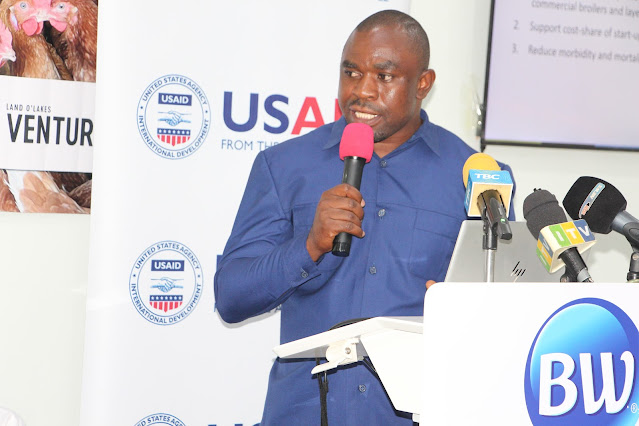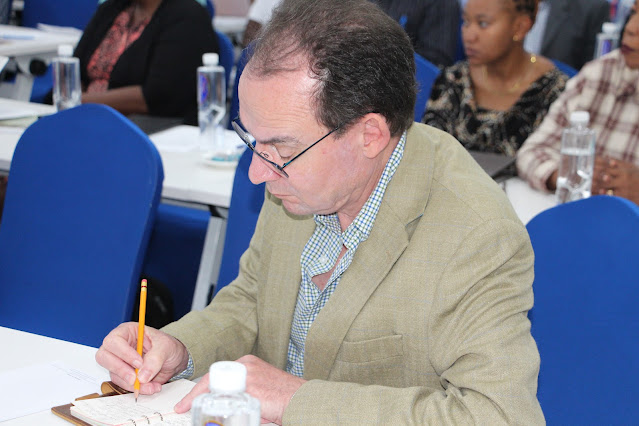 |
By VALENTINE OFORO, Dodoma
THE international and local livestock institutes are teaming-up with the potential poultry sector stakeholders to introduce a major project targeting to improve and accelerate chicken keeping activities towards the youth and women poultry farmers in Dodoma region.
Bankrolled by the USAIDS at a far tune of at least $2million, the two -year initiative have been hatched to expand access to improved breeds of dual-purpose backyard village chickens, especially commercial broilers and layers, and is expected to reach out to a total of 18,000 farmers in Dodoma rural and urban.
Dubbed ‘Accelerated Innovation Delivery Initiative –Livestock’ (AID-L) Tanzania, the robust initiative which has been designed for implementation across all eight districts of Dodoma region also focuses to support cost-share of start-ups and scale-ups, as well as reducing morbidity and mortality of poultry through advisories and mass media

.

The institution institutions behind the meaningful economic project include the International Livestock Research Institute (ILRI), Tanzania Livestock Research Institute (TALIRI), International Maize and Wheat Improvement Center (CIMMYT), and Land O lakes Venture 37.
And the stakeholders in the project incorporate Silverlands Tanzania Limited, Interchick Company Ltd and the Poultry Association of Tanzania (PAT) to mention but a few.
The hatched initiative, is a brainchild of the Southern Africa Accelerated Innovation Delivery Initiative (AID-I) Rapid Delivery Hub, the $50million worth 36 month initiative which is being implemented in the four countries of Democratic Republic of the Congo, Malawi, Zambia and Tanzania, focusing to reach out to a total of 3 million beneficiaries.
Speaking yesterday during launching of the initiative, Adolf Jeremiah, the research coordinator for ILRI in Tanzania expressed that the initiative was working to empower the poultry farmers in the region to modern technologies so as to execute their activities more commercially and with needed productivity.

He expressed that the project was a gender- based responsive private sector- led women and youth - focused improved chicken - based intervention to contribute to improved food and nutrition security and rural incomes, saying it will run for 18 consecutive months.
Among others targeted outcomes, according to Jeremiah is to further increasing access to improved breeds by the involved number of the project’s beneficiaries through women and youth -focused broader units and vendors.
"The initiative will also work to heighten access to bundled advisory services, inputs, and off- takers through agri-entrepeneurs," he communicated.
Talking about supporting cost- share of start-ups and scale-ups, he said the initiative target to increase business oriented for at least 80 women and youth broader, and 200 vendors through capacity building and actor linkages.
"As per the project’s design, an entrepreneurial ecosystem approach to delivery module will be applied, to increase access to investment capital (cost shared and village saving and loan groups), " he expressed.
To be implemented in the nature of gender- transformative in private sector - led, the robust project focuses to solve the myriad challenges troubling the poultry farmers, in both rural and urban areas of Dodoma region.
"Poultry, if managed professionally, is a simple and short-term income generating project which can allow the involved households to escape from the shackles of poverty, " he observed.
Under the project’s rolling-out, he detailed that the county's key chicken producer companies will hatch and produce to the farmers the best improved and vaccinated chicken breeds, and there will be a constructive move to sensitize the financial institutions to inject the farmers will friendly capital loans.

"We're going also to ensure the beneficiary poultry farmers are linkage to profitable and assured markets," he added.
In her remarks, the Dodoma Regional Commissioner (RC) Rosemary Senyamule who graced the project’s official inception event, challenged the youth and women in the region to make full use of the prestigious economic opportunity.
She observed, basing on the fact that at least 72 percent of the people in the region are banking on farming and livestock, the initiated project was meaningful to scale up the economy of a record number of households, as well as the entire region as a whole.
"We, at Dodoma are impressed with the cropping up of this project in our side as it will unlock a number of potential economic and job opportunities throughout its relevant value chain activities, " she appreciated, added: "At the government level, we're ready to accelerate the mission,"

Adding his voice to the project, Amos Omore, the ILRI Regional Representative, Eastern and Southern Africa unveiled that the project is for expanding the availability of chicken meat and eggs in Dodoma region.
He said poultry offers greater opportunity to improve livelihoods and economy, urged the citizens in all districts of Dodoma to stand at fore in order to benefit from the key initiative.
"Currently, population is growing faster and people are urbanising to the tune of consuming more animal sources of foods, including chicken, and thus, this project has surfaced at a right time," he observed.

Presenting the project’s donors remarks, Junior Ndesanjo, the Project Management Specialist - Agriculture, USAID, the world's premier international development agency and a catalytic actor have decided to fund the initiative with an eye to improve productivity in the poultry sector value chain in Dodoma region
He briefed, the World Animal Production (WAP) Africa 2017, United Nations (FAO) statistics and Netherlands Africa Business Council (NABC) analysis 2017 shows that Tanzania produces more chicken layers, broilers than neighbouring Kenya and Uganda.
He further detailed, the market growth for the sector in Tanzania is currently at 5 percent potentially, reaching $403million as of 2023.

"The poultry consumption in east africa has been growing significantly, whereby presence of breeds is less than 5 percent with investment in day old chicken hatcheries, breeds and research, " he informed.
According to him, the USAID Grain and Feed Report of April 2024 depicts that feed consumption is anticipated to shrink by 10 percent, to at least 450,000 metric tons (MT) as poultry and livestock companies either reduce their stock, or exist production due to high protein food crops.
"As per the report in question, local feed manufacturers reported that most soybeans extrusion in Tanzania have closed operations as they cannot source affordable soybeans for producing feed. Most soybeans for animal feed are imported from countries like Malawi and Zambia, " he unveiled.

Over 80 percent of households across Tanzania keeps chicken, according to the National Bureau of Statistics (NBS), 2021, and they keep about 75 million chicken, equivalent to 85 percent of the total poultry production nationally, a significant part of the livestock's contribution to 26 percent of agri-GDP.



The institution institutions behind the meaningful economic project include the International Livestock Research Institute (ILRI), Tanzania Livestock Research Institute (TALIRI), International Maize and Wheat Improvement Center (CIMMYT), and Land O lakes Venture 37.
And the stakeholders in the project incorporate Silverlands Tanzania Limited, Interchick Company Ltd and the Poultry Association of Tanzania (PAT) to mention but a few.
The hatched initiative, is a brainchild of the Southern Africa Accelerated Innovation Delivery Initiative (AID-I) Rapid Delivery Hub, the $50million worth 36 month initiative which is being implemented in the four countries of Democratic Republic of the Congo, Malawi, Zambia and Tanzania, focusing to reach out to a total of 3 million beneficiaries.
Speaking yesterday during launching of the initiative, Adolf Jeremiah, the research coordinator for ILRI in Tanzania expressed that the initiative was working to empower the poultry farmers in the region to modern technologies so as to execute their activities more commercially and with needed productivity.

He expressed that the project was a gender- based responsive private sector- led women and youth - focused improved chicken - based intervention to contribute to improved food and nutrition security and rural incomes, saying it will run for 18 consecutive months.
Among others targeted outcomes, according to Jeremiah is to further increasing access to improved breeds by the involved number of the project’s beneficiaries through women and youth -focused broader units and vendors.
"The initiative will also work to heighten access to bundled advisory services, inputs, and off- takers through agri-entrepeneurs," he communicated.
Talking about supporting cost- share of start-ups and scale-ups, he said the initiative target to increase business oriented for at least 80 women and youth broader, and 200 vendors through capacity building and actor linkages.
"As per the project’s design, an entrepreneurial ecosystem approach to delivery module will be applied, to increase access to investment capital (cost shared and village saving and loan groups), " he expressed.
To be implemented in the nature of gender- transformative in private sector - led, the robust project focuses to solve the myriad challenges troubling the poultry farmers, in both rural and urban areas of Dodoma region.
"Poultry, if managed professionally, is a simple and short-term income generating project which can allow the involved households to escape from the shackles of poverty, " he observed.
Under the project’s rolling-out, he detailed that the county's key chicken producer companies will hatch and produce to the farmers the best improved and vaccinated chicken breeds, and there will be a constructive move to sensitize the financial institutions to inject the farmers will friendly capital loans.

"We're going also to ensure the beneficiary poultry farmers are linkage to profitable and assured markets," he added.
In her remarks, the Dodoma Regional Commissioner (RC) Rosemary Senyamule who graced the project’s official inception event, challenged the youth and women in the region to make full use of the prestigious economic opportunity.
She observed, basing on the fact that at least 72 percent of the people in the region are banking on farming and livestock, the initiated project was meaningful to scale up the economy of a record number of households, as well as the entire region as a whole.
"We, at Dodoma are impressed with the cropping up of this project in our side as it will unlock a number of potential economic and job opportunities throughout its relevant value chain activities, " she appreciated, added: "At the government level, we're ready to accelerate the mission,"

Adding his voice to the project, Amos Omore, the ILRI Regional Representative, Eastern and Southern Africa unveiled that the project is for expanding the availability of chicken meat and eggs in Dodoma region.
He said poultry offers greater opportunity to improve livelihoods and economy, urged the citizens in all districts of Dodoma to stand at fore in order to benefit from the key initiative.
"Currently, population is growing faster and people are urbanising to the tune of consuming more animal sources of foods, including chicken, and thus, this project has surfaced at a right time," he observed.

Presenting the project’s donors remarks, Junior Ndesanjo, the Project Management Specialist - Agriculture, USAID, the world's premier international development agency and a catalytic actor have decided to fund the initiative with an eye to improve productivity in the poultry sector value chain in Dodoma region
He briefed, the World Animal Production (WAP) Africa 2017, United Nations (FAO) statistics and Netherlands Africa Business Council (NABC) analysis 2017 shows that Tanzania produces more chicken layers, broilers than neighbouring Kenya and Uganda.
He further detailed, the market growth for the sector in Tanzania is currently at 5 percent potentially, reaching $403million as of 2023.

"The poultry consumption in east africa has been growing significantly, whereby presence of breeds is less than 5 percent with investment in day old chicken hatcheries, breeds and research, " he informed.
According to him, the USAID Grain and Feed Report of April 2024 depicts that feed consumption is anticipated to shrink by 10 percent, to at least 450,000 metric tons (MT) as poultry and livestock companies either reduce their stock, or exist production due to high protein food crops.
"As per the report in question, local feed manufacturers reported that most soybeans extrusion in Tanzania have closed operations as they cannot source affordable soybeans for producing feed. Most soybeans for animal feed are imported from countries like Malawi and Zambia, " he unveiled.

Over 80 percent of households across Tanzania keeps chicken, according to the National Bureau of Statistics (NBS), 2021, and they keep about 75 million chicken, equivalent to 85 percent of the total poultry production nationally, a significant part of the livestock's contribution to 26 percent of agri-GDP.




Post a Comment